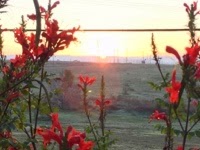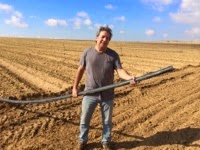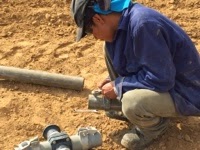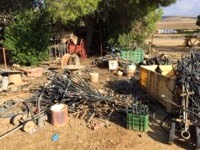
First Impressions
Lori and I arrived last night at dusk. Neither of us had been in Israel since 1978. Thirty six years – today Lori is more than double her age since then, as am I, as is Israel. Much has changed in all our lives and I’m pleased to report that it has been for the better in all cases. Here the roads, the infrastructure, the agricultural and social development are all indicatives of a society that has matured daramatically in the past three and a half decades.
Much, I am sure,,` will follow in our reports over the next month, so let’s set the current scene and go from there. For the first week of our placement we are living in a kibbutz in the Negev, about 10 kilometers from Be’er Sheva. The kibbutzim were the founding force behind the creation of the state. A place for idealists and intellectuals to develop autonomous communities based on communist principals. Each according to his needs, everybody equal and everybody contributes to the collective good. In my opinion, the only successful iteration of the communist ideology in the history of mankind was manifest here. The romanticism and idealism has melted away, indicating that the kibbutz era was a phenomena that allowed the country to establish roots. As success and modernization manifest, the need and desire to remain part of a greater whole has mostly melted away. Cities have grown as the young moved off the land, became educated and the desire to sublimate the individual in favour of the greater good has lost its cachet.
Volunteers from around the world populated the kibbutzim for decades. In exchange for providing labour in the fruit fields, the kitchen, the laundry or the kibbutz factory, travelers would be assured food, shelter and usually a darned good time. It was a way to recharge batteries, avoid winter and hang out with similar aged individuals from all corners of the globe.
Israel has changed. Volunteers arer virtually extinct; much of the labour force comes from outside the country, and those that remain are by and large massive collectives sharing resources as the land gets developed. As internaational volunteers across the globe for the past five years, Lori and I have had to adapt to local conditions wherever we have been. No different in this case. We have a private cottage, indoor plumbing, hot water, heating and air conditioning, beds with mattresses, a kitchen, electricity and access to a rented car. So much for Spartan.place.
Always in denial of my approaching pensioner status, I’ve again opted to try to keep up with those place.So here’s day one. Lori has opted to continue to allow the world to believe that she is the kind, sensitive and understanding one of the two of us. To that end, she has chosen to work with a group of low functioning autistic young adults in the morning, and in the afternoon assisting with outdoor gardening including schlepping handmade clay bricks, digging holes in rocky dry earth, carrying tree trunks, bags of straw and buckets of sand to construct an archway to an existing community garden, a self conceived project of one of the kibbutzniks named Merav. Of the three residents Lori has met today, one moved here from Agentina at age 11, another at roughly the same age from India and the third, Merav, who opted for kibbutz life over living in Tel Aviv. Guaranteed that by the time she finishes her placement here Israel will be a better
Always in denial of my approaching pensioner status, I’ve again opted to try to keep up with those decades younger than me, spending my time working the land. By 7 this morning I was taken to the newest section of the area that is being developed. While the Negev has been a desert since Jesus was a boyscout (in fact his troop often camped out around here), the modern Israeli will have none of that. The desert is in full expansion mode.
Irrigation, utilising locally developed technology is allowing amongst the most inhospitable land to bear fruit. And vegetables. And grain. After touring the peach orchards, the onion fields (no Joseph Wambaugh), and the wheat fields, I was put to work assembling irrigation pipes for the upcoming potato crop.
Given their sophisticated methods of installation, it was incredible how much was accomplished per hour. I haven’t laid that much pipe so quickly since, well, the last time I was on kibbutz, but that’s a different story altogether. Look out PEI, the Israelis have developed a hybrid potato that is light and fluffy and is being exported to Russia and Europe at present. Think about it – Israel exporting potatoes to Russia! Since Channukah starts the day after tomorrow, I highly doubt that the crop will be ready by then, but don’t bet that you will not be eating Israeli latkes in 2015.
Our workforce consisted of Gal, Guy, me and four Thai workers. According to my hosts, the Thai have a five year work visa during which time they arrive in Israel, make hay, or cotton, and head back to support their families. According to Gal, they are the best workers in the country. They do the work that today no Israeli would deign to undertake. Very strange speaking to a Thai in Hebrew, though.
Speaking of speaking, I never thought that I would acknowledge this but my five years spent at parochial school has provided me with sufficient linguistic skills to communicate in a third language (four if you count pig-latin). Ninety percent of my day was spent speaking hebrew. Fifty percent of my day was spent understanding it. Needs work, but the basics are there.
Heading to the fields, we drove past a ramshackle town. (Note camel in foreground).
It was populated by a community of Bedouins who have decided to relinquish their nomadic ways and attempt to modernize themselves. There is a long way to go. Unfortunately, many problems exist between them and the Israelis. Cultural change is slow and difficualt; inherent distrust of the Israelis does not help the situation and is only enhanced when the Bedouins see land that had been their range to roam on become irrigated and spew forth produce. There are piles of cars stripped for parts, there are corrugated fences deliniating their territory; there is a sense of hopeless resignation eminating from the village in much the same way that calls to prayers eminate from the omni-present mosques. Vandalism to the irrigation systems is prevalent as the village is only a stone’s throw away (literally) from the orchards to be. The territory reminds me of Kanesetake, the Indian reserve adjacent to Montreal’s south shore communities. Surrounded by growth, commercialism, modern roads and an ever expanding residential base, the reserve is now an island of tar paper shacks, alcoholism, casinos as well as a haven for selling cheap cigarettes and gasoline. The comparison between the two is palpable.
Despite occasional reminders, as I explained to Guy while we were establishing man made mini rivers, Israelis are living inside a miracle. Many either do not realize this fact or are being typical Israelis by pretending to ignore it.







Cookieman
Posted at 23:33h, 15 DecemberDidn't I see you on the L Train last week? You really get around. I recommend that you be careful not to get sand in the parts when you are laying pipe, it can be a source of great irritation. And perhaps you can use your adeptness and extra sand experience as leverage for your application to Royal.
PS. Fix the damn pictures, they are loading as thumbnails only.
Sheana Parker
Posted at 17:01h, 18 DecemberLove it – keep writing.